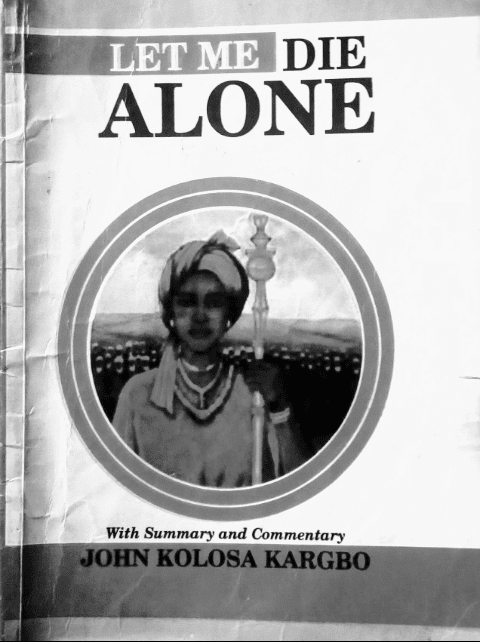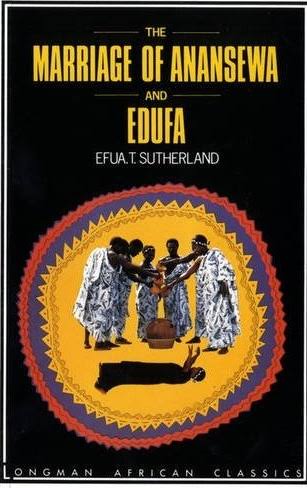A theme is a unifying idea that is a recurrent element in literary or artistic work. John K. Kargbo’s Let Me Die Alone is imbued with quite a number of salient themes.
The play explores the topical issues of colonialism, gender discrimination, betrayal, excessive desire for power, suicide, homicide, human sacrifice, and a listless others. These issues further accentuate the artistic quality and social relevance of the play.
Discussed below are the themes in Let Me Die Alone.
THEME OF BETRAYAL: This is probably the most prevalent theme in the play. It plays a significant impact in the plot development of the play. Both Lamboi and Musa betray the community and some prominent characters. Lusting for power, Lamboi recruits the services of Musa, the chief priest to help with his plan to unseat Gbanya permanently from his throne, in order to prevent him from appointing Yoko as his next successor.
Musa could have chosen not to comply but he had skeletons in the cupboard; things he would not want the public to get wind of. He has offered human sacrifices severally in exchange for prosperity and longevity. He has long betrayed his good office with his indulgence in human rituals all in the name of seeking the goodies of life.
When the opportunity presents itself, the duo betray Gbanya by appearing to relieve him of the lowly humiliation Dr Rowe subjected him to. They poison him, and Lamboi attempts to usurp his throne. Thus, they betray an unsuspecting Gbanya who had trusted them with his life, and taken them as allies.
Again, they betray Yoko, Gbanya’s successor. Rather than perform their advisory and priestly duties, Lamboi and Musa choose to mislead the villagers about Yoko. They kill Jeneba, mutilate her and bury her body. However, they cajole the villagers to believe that Yoko has buried the poor girl’s body alive so she could receive favours from the colonial governor. This betrayal and the humiliation that follows largely influence Yoko’s suicide.
In a nutshell, Musa and Lamboi betray Gbanya, Yoko and their public offices in their lust for power.
THEME OF COLONIALISM: The presence of the colonial governor, the messenger, the fighting white men and the denigrating treatment of local traditional rulers suggest the colonial atmosphere that surrounds the entire play. Dr Rowe’s treatment of Gbanya is highly suggestive of the aura of impudence and self-professed superiority colonial administrators exuded. By deciding to strip Yoko of her newly-acquired territories, Dr Rowe further demonstrates how these colonial administrators took Africans for granted. It will be recollected that Yoko painstakingly consults the governor before she embarks on her conquest of new territories. She does not go off limit but the governor strips her of the territories all the same.
Considerably, the powerlessness and puppetry of African traditional rulers is brought to notice.
THEME OF GENDER DISCRIMINATION: In Senehun and Mendeland at large, women are not treated as equals of men. Women are considered fragile, vulnerable and incapable of managing crises. At the beginning of the play when Gbanya drags Yoko into the inner chamber, he claims that he needs Yoko more than her Sande girls. To him, women have no responsibility than to satisfy men’s sexual urge.
Initially, Gbanya has promised Yoko she would be his successor. However, with troubles around, he feels reluctant to handover the throne to her because he believes women cannot handle a land at war. This is the same stance of Lamboi. The excuse he gives for wanting to kill Gbanya is because he does not want the latter to appoint Yoko as his successor.
Obviously, if not for Yoko’s doggedness and insistence, a woman would not have become the chief of Mendeland; talk more of expanding the chiefdom.
In Mendeland, women usually are not allowed into the Poro cult. Yoko is the only exception. In the village, there is a certain prejudice held against women. They are considered inferior and except for Yoko who forges ahead, women are not assigned ruling positions.
THEME OF EXCESSIVE DESIRE FOR POWER: Lamboi craves for the throne of the chief and would do anything to become the chief of Mendeland. He recruits Musa with the excuse that a woman should not rule them. In his desperation to become the chief, he kills a chief and inspires the death of another.
Killing Gbanya is not the original plan but there is no way to become the king without taking away the incumbent chief and any opposition.
THEME OF HOMICIDE: Both Musa and Lamboi poison Chief Gbanya to death. They are also the killers of Jeneba.
THEME OF HUMAN SACRIFICE: Musa, the chief priest, indulges in human sacrifice. He often sacrifices children in order to gain prosperity, good health and longevity. Lamboi threatens him with this shameful secret of his and gets him into his plan to kill Gbanya. The cruel death and mutilation of Jeneba considerably spells out human sacrifice in the text.
THEME OF SUICIDE: Humiliated and frustrated by her subjects, Yoko becomes overcome by depression, “a disease of the mind”. The message from Dr Rowe adds salt further to her injury. She decides to commit suicide. She poisons herself amidst pleas from her trusted attendants.
 WHATSAPP: Click HERE to join the new Literature PADI WhatsApp group to receive latest updates on your phone and for further literary discussions!
WHATSAPP: Click HERE to join the new Literature PADI WhatsApp group to receive latest updates on your phone and for further literary discussions!










Very useful and valuable material. Thank you!
I love this website because it gives me the correct sus I need
Thank you
The act and evil did of Musa and Lamboi are every day happening in our country around the political landscape of Sierra Leone .
Thanks for the knowledge shared
African beliefs as a theme in this play is not stated ‘ why
We obviously can’t discuss all the themes present in the text. You can add yours too. That’s what the comment section is meant for.
I love all the literature text
Me too
I love this literature text
Keep the good work sir
thank you
I really like this,it is so helpful.
Comments are closed.